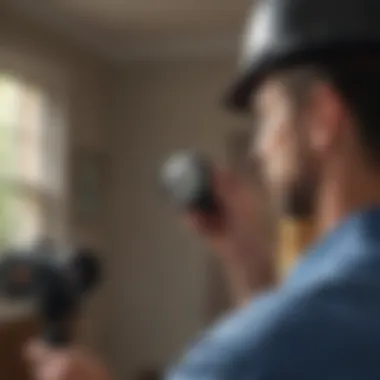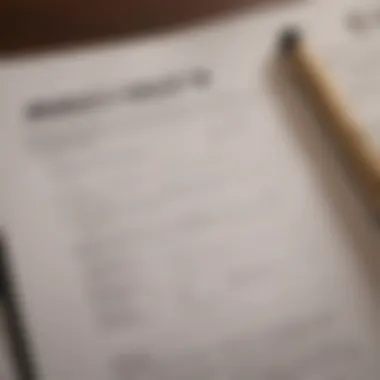Is a Home Inspection Necessary for FHA Loans?


Intro
When considering an FHA loan, many potential homeowners often wonder about the role of a home inspection in the process. Understanding whether a home inspection is necessary can influence the buying experience significantly. In this section, we will delve into the nuances surrounding inspection requirements, their implications, and how they relate to FHA loans.
Overview of Financial Product
Definition of Product
An FHA loan, or Federal Housing Administration loan, is designed to help lower-income buyers obtain financing for their new homes. This government-backed loan program typically has lower down payment requirements and is accessible to a wider range of borrowers.
Importance of the Product for Consumers
FHA loans are important for consumers who may not qualify for conventional financing. They provide an opportunity for individuals with limited credit history or lower credit scores to purchase homes. Thus, they play a crucial role in making homeownership more accessible.
Types of Available Options
There are various FHA loan options. These include the standard FHA loan, the 203(k) loan that allows for home renovations, and the Home Equity Conversion Mortgage for seniors. Each serves different target audiences with particular needs and financial situations.
Home Inspection and FHA Loans
While a home inspection is not formally required for FHA loans, it is highly recommend. An inspection serves to uncover any potential issues with the property. This can cover everything from structural integrity to electrical systems. Knowing the condition of the home can protect buyers from costly repairs down the line.
Important: An inspection can protect both borrower and lender interests.
Benefits of Home Inspections
- Identify Issues Early: Catching problems before purchase can save money.
- Negotiation Tool: Results can help in negotiations to adjust price.
- Safety Assurance: Inspections ensure the safety of living conditions.
Drawbacks
- Cost: Inspections require upfront payment.
- Time: The process can add time to the buying journey.
The End
Understanding FHA Loans
FHA loans are a crucial financial tool for many homebuyers. They cater specifically to those who may not qualify for traditional financing due to lower credit scores or lack of substantial down payments. Understanding the intricacies of FHA loans can assist potential homeowners in making educated decisions. The terms and benefits associated with these loans are important for both lenders and borrowers. Grasping what an FHA loan entails will help outline the necessity and potential impact of home inspections during the buying process.
Definition and Purpose
An FHA loan is a mortgage insured by the Federal Housing Administration. Established during the Great Depression, its primary purpose is to stimulate homeownership by making financing more accessible. These loans are particularly beneficial for first-time buyers, enabling them to purchase a home with a down payment as low as 3.5% if their credit score meets specific requirements. The federal backing provided by FHA reduces the risk for lenders; thus, becoming an attractive option for many. This accessibility plays an essential role in promoting stable communities and fostering economic growth.
Eligibility Criteria
To qualify for an FHA loan, borrowers must meet certain criteria. Generally, applicants need:
- A minimum credit score of 580 for the 3.5% down payment.
- A debt-to-income ratio that does not exceed 43%.
- Proof of steady employment or other reliable income sources.
Beneficially, there are no restrictions on the borrower’s age or income level. However, it is imperative to note that the property itself must meet specific safety and livability standards. Each of these considerations allows for a more comprehensive understanding of financial commitments and requirements, ultimately influencing decisions around home inspections.
Importance of Home Inspections
Home inspections serve as a critical component of the home buying process, especially when considering an FHA loan. This section delves into the various facets that underscore the significance of these inspections, offering insights that aid both buyers and lenders in making informed decisions.
Role in Property Valuation
Home inspections play an essential role in the valuation process of a property. Appraisers and lenders require a thorough inspection to determine the worthiness of a home. Potential buyers benefit from knowing that the value assessed is based on tangible conditions rather than just market speculation. The information gathered can directly influence sale negotiations and future financing options.


Moreover, understanding the appraised value aids in identifying whether the asking price aligns with the property's condition and market trends. If significant repairs are needed, it is crucial to factor those costs into the overall value.
Identifying Structural Issues
A home is a complex structure that can conceal various problems. Home inspections help uncover hidden defects that might not be visible during a casual walkthrough. Issues such as faulty wiring, plumbing problems, or structural weaknesses can lead to substantial costs in the future. By identifying these issues before the transaction closes, buyers hold significant leverage in negotiations.
The findings from an inspection also allow for prioritization of repairs. Buyers can organize their budgets more effectively when they know what needs immediate attention compared to issues that can wait. Ignoring structural issues can lead to dangerous situations, including safety hazards for future occupants.
Impacts on Insurance and Financing
Insurance companies often require home inspections before issuing policies. They want to mitigate their risks by ensuring that the property is insurable. The findings of a home inspection can directly affect insurance premiums; homes in good condition may yield lower rates, while those with problems might lead to higher costs or difficulties in obtaining coverage.
In relation to financing, lenders consider the condition of the property as a factor in loan approval. A clean, thorough inspection might increase the chances of securing favorable financing terms, while a problematic inspection can lead to higher interest rates or even denial of the loan.
Important Note: Home inspections can uncover issues that impact both insurance rates and financing options. Buyers are strongly advised to prioritize these inspections to avoid future financial surprises.
In summary, the significance of home inspections cannot be overstated. They ensure that buyers are informed about the property’s condition, assist in negotiations, affect loan approvals, and shape insurance premiums. Being well-versed in these aspects equips homebuyers with knowledge that impacts their investment positively.
FHA Requirements for Home Inspections
Understanding the FHA requirements for home inspections is essential for both lenders and borrowers. The Federal Housing Administration lays out certain standards to ensure that properties are safe and habitable. While a home inspection is not always compulsory, being informed about these guidelines can help buyers avoid potential pitfalls.
Mandatory Inspection Guidelines
The FHA does not always mandate a home inspection as part of its financing program. However, it requires that a property meets specific safety and livability standards. If a home buyer is borrowing funds through an FHA loan, the home must undergo an appraisal by a licensed FHA appraiser. This appraisal evaluates the property to ensure it complies with FHA guidelines.
The appraiser will check for basic elements such as:
- Roof condition
- Functioning heating systems
- Safe electrical systems
- No evidence of water damage
While this evaluation is not a substitute for a full home inspection, it ensures that the property meets minimum safety standards, thereby protecting the lender's investment.
The Role of the Appraiser
An appraiser’s responsibilities extend beyond determining property value. In the context of FHA loans, the appraiser serves as a safeguard, checking if the property adheres to necessary guidelines. They examine aspects like zoning and compliance with building codes. The appraiser often notes any repairs needed to meet FHA standards.
An important point to consider is that an appraisal does not examine every detail of the home. It focuses primarily on the external and structural aspects, meaning underlying issues may go unnoticed. Homebuyers should recognize that relying solely on an appraisal is not sufficient to fully understand the condition of the property.
Important: An appraiser’s findings can affect the loan amount approved by the lender. If significant issues are reported, the buyer may face challenges in securing the necessary financing.
Limitations of the FHA Appraisal Process
The FHA appraisal process has inherent limitations. While it's vital for ensuring properties meet minimum safety standards, it is not exhaustive. \n Some limitations include:
- Scope of Inspection: Appraisals primarily assess visible and accessible features. Hidden issues may not be identified.
- Repair Requirements: The FHA requires certain repairs to be made, but not all recommended repairs must be addressed before loan approval.
- Market Variations: In certain markets, especially competitive ones, buyers might waive additional inspections, relying solely on the FHA appraisal.
Thus, while the appraisal process is crucial, it should not replace a thorough home inspection. Buyers should evaluate the pros and cons of obtaining a full inspection to understand the long-term implications of their purchase thoroughly.
When Inspections Are Not Required
In certain instances, home inspections may not be mandated when applying for an FHA loan. Understanding these situations is essential for potential homebuyers. While inspections generally provide valuable insights into a property, there are specific scenarios where they might not be necessary. This section outlines the key elements related to when inspections are optional, as well as some potential benefits and considerations.
Exemptions and Waivers
FHA guidelines have specific exemptions where a home inspection may not be needed. These exemptions often relate to the property's conditions and age. For example, if a borrower is purchasing a newly constructed home that is under warranty, they might not be required to undergo a home inspection.
Additionally, some borrowers may qualify for waivers based on prior inspections or certifications. For instance, if the property has been recently assessed by a qualified professional and meets specific FHA standards, a new inspection may not be necessary. However, relying on these exemptions requires careful consideration. Buyers should ensure that the property truly meets the criteria laid out by the FHA and should consult with their mortgage lender or a real estate professional regarding potential waivers.
Market Variations Affecting Requirements


Geographical and market factors can also influence whether a home inspection is required. In highly competitive housing markets, sellers might agree to forgo inspections to attract buyers. In such cases, the market dynamics can force buyers to accept properties with limited or no inspections. This is especially evident in urban areas where demand exceeds supply.
Conversely, in slower markets, buyers often have the upper hand. Here, it becomes common practice to insist on home inspections, even if they are not required for FHA eligibility. The market's condition can thus change the dynamics of home buying and whether a buyer feels compelled to have an inspection done.
Understanding these market variations is crucial for making informed decisions throughout the home buying process.
It is essential for candidates to weigh these exemptions and market considerations carefully. Skipping a home inspection can save time and money initially, but it can also pose significant risks in the long run. Buyers should remain vigilant, educated, and conscious of the implications of bypassing this critical assessment step, even when it is not required.
Potential Costs of Home Inspections
Understanding the potential costs associated with home inspections is crucial for anyone considering an FHA loan. While FHA loans may make home purchasing more accessible, they also introduce various expenses that buyers should account for in their budgeting. Knowing these costs helps buyers make informed decisions and avoid unexpected financial strain.
Typical Fee Structure
Home inspection fees can vary widely based on several factors, including location, property size, and inspector experience. On average, buyers can expect to pay between $300 and $500 for a standard inspection. However, these fees can go higher depending on specific circumstances.
In addition to the basic fee, certain other costs may arise, such as:
- Radon testing: Sometimes added if the property is in a radon-prone area, typically costing an additional $100 to $200.
- Mold inspection: If there's suspicion of mold, this service can run between $200 and $500.
- Pest inspection: Often performed to check for termite or other pest damage, generally costing around $50 to $150.
This fee structure emphasizes the need to budget appropriately when considering a home purchase.
Factors Influencing Costs
Several factors can affect the overall cost of a home inspection. Understanding these variables allows buyers to anticipate expenses and choose their inspectors wisely. Important factors include:
- Geographic location: Inspectors in urban areas may charge more than those in rural locations. The cost of living and demand in a region influences pricing.
- Inspector experience: More seasoned inspectors might charge higher fees due to their expertise and reputation.
- Property type: The size and complexity of the property may lead to higher costs. For example, inspecting a larger home with intricate systems can take more time and effort.
“Investing in a thorough inspection can save money in the long run by preventing unforeseen repairs.”
- Inspection scope: Additional services, such as specialized inspections (radon, lead-based paint), will naturally increase the total cost.
Alternatives to Home Inspections
Considering a home inspection is essential for FHA loans, but there are alternatives available. Understanding these alternatives can save time and money for homebuyers. While inspections are often advisable, some alternatives may still provide valuable insights into the property condition. Here are two primary alternatives worth exploring.
Self-Assessments and DIY Checks
Before a formal inspection, some buyers choose self-assessments. This involves a thorough examination of visible aspects of a home, which can help gauge its condition before moving forward.
Key Steps in Self-Assessment:
- Exterior Review: Start with the roof, gutters, and siding. Look for any obvious damage, such as missing shingles or cracked surfaces.
- Foundation Check: Inspect the foundation for cracks or dampness. These can indicate more severe issues.
- Interior Inspection: Examine walls, floors, and ceilings for irregularities like water stains or cracks.
- Systems Overview: Test basic systems like electricity and plumbing. Ensure that faucets run correctly and outlets are functional.
Self-assessments have a few advantages. They are cost-effective and can help identify clear issues to address before more substantial commitments.
However, several limitations are present. Without the expertise of a professional, crucial problems might go unnoticed. Lacking specific tools and experience could lead to oversights, especially in less visible areas such as attics or basements.
Utilizing Real Estate Agents
Real estate agents often play a pivotal role in the home-buying process. Their expertise extends beyond sales; they can help navigate potential issues that may arise with properties. Using a real estate agent effectively provides another layer of support for buyers, especially first-time homebuyers.
Advantages of Working with Agents:
- Local Market Knowledge: Agents typically have insider knowledge of properties based on their experience. They can help identify homes less likely to require major repairs.
- Access to Resources: Most agents have contacts with home inspectors, contractors, and repair services. This can be beneficial for buyers needing quick assessments or repairs.
- Negotiation Skills: An experienced agent can negotiate terms and conditions based on the state of the property.
While agents can guide buyers well, they are not substitutes for home inspectors. An agent's perspective might be subjective, influenced by the goal to close a sale. However, they provide valuable support in managing expectations about a property's condition.


In summary, while the intent behind self-assessments and utilizing real estate agents is to provide insight into property condition, they each have strengths and weaknesses. For serious buyers, these alternatives can complement the home inspection process but should not replace it entirely.
Risks of Skipping Home Inspections
Buying a home is a significant investment. The FHA loan process offers various advantages to borrowers. However, skipping a home inspection can pose serious risks. Home inspections serve to uncover issues that may not be visible during open house viewings. Neglecting this step can lead to facing hidden problems in the future, which can be financially and emotionally taxing. Understanding these risks helps buyers make informed decisions.
Hidden Issues and Financial Implications
One of the central risks of forgoing a home inspection lies in revealing hidden issues. Properties can have various underlying problems, such as plumbing troubles, electrical malfunctions, or foundational damage. If these issues go unnoticed, the buyer is left to pay for repairs once the home is theirs.
The financial implications of these hidden issues can be significant. For example, basement flooding or a failing roof may require realignment of the budget or even borrowing more funds. It becomes a burden that could have been avoided with a simple inspection. Homeowners can also face difficulties in resale if major issues arise post-purchase.
Not identifying hidden issues can lead to repair costs amounting to thousands of dollars, which may not be accounted for in the initial Purchase Agreement.
Impact on Long-Term Maintenance
Additionally, skipping home inspections may affect long-term maintenance plans for the property. Recognizing existing issues early on allows buyers to plan for adequate maintenance. Without this awareness, problems can escalate, leading to more severe damage and higher repair costs over time.
Moreover, a lack of understanding of the property’s condition can lead to poor budgeting for necessary upgrades or repairs. This mismanagement can inhibit the homeowners’ ability to enjoy their home fully, as they might face unexpected repairs during critical times.
In summary, the risks of skipping home inspections extend beyond immediate financial implications. They seep into long-term homeownership experiences, affecting enjoyment, financial stability, and peace of mind.
Best Practices for Homebuyers
A well-informed homebuyer can navigate the complexities of purchasing a home, especially when seeking an FHA loan. Understanding best practices enhances the buyer's experience and ensures a smoother transaction.
Choosing Qualified Inspectors
Selecting a qualified home inspector is crucial. A credible inspector possesses relevant experience and certifications. This individual's role is to thoroughly evaluate the property’s condition before the purchase. By doing so, they can uncover existing issues that the buyer might not initially see.
When searching for inspectors, focus on their qualifications. In many states, home inspectors must meet specific licensing requirements. It's beneficial to consider inspectors who are members of reputable organizations, such as the American Society of Home Inspectors (ASHI) or the International Association of Certified Home Inspectors (InterNACHI).
Key factors to consider when choosing an inspector include:
- Referrals and Reviews: Seek recommendations from real estate agents, friends, and family. Reading online reviews can also provide insights into the inspector's reputation.
- Sample Reports: Request to see a sample inspection report. This will give you an idea of how thorough their evaluations are.
- Experience: Look for inspectors with a significant amount of experience, particularly in the type of property being purchased (for instance, older homes may require a different approach).
It's also important to interview potential inspectors. Ask them about their process, areas of focus, and how they communicate any findings. Open communication fosters trust and ensures you have a clear understanding of the property.
Understanding Inspection Reports
An inspection report represents the outcome of a detailed assessment. Such reports can be complex and filled with technical language, making them challenging to interpret. Thus, knowing how to read and understand these documents is vital for any homebuyer.
Typically, the report will be divided into categories such as:
- Exterior: The state of the roof, siding, and foundation.
- Interior: Condition of floors, walls, and ceilings.
- Systems: Overview of plumbing, electrical, and HVAC systems.
As you review the report, pay attention to:
- Severity of Issues: Inspectors often categorize findings. Minor issues may require easy fixes, while major concerns could lead to significant costs.
- Recommendations for Action: Inspectors may suggest further evaluations by specialists for certain issues, like mold or structural concerns. It’s essential to act on these recommendations.
- Overall Assessment: Take note of any summative statements made by the inspector regarding the property's condition.
Remember, understanding the inspection report requires careful consideration. Don’t hesitate to ask your inspector questions about their observations and recommendations.
Ends and Recommendations
Summary of Key Points
In this article, we examined the necessity of home inspections in the context of FHA loans. An FHA loan can be an attractive option for many homebuyers due to its lower down payment and more lenient credit requirements. However, the importance of home inspections cannot be overstated. First, we discussed the regulatory framework that governs FHA loans, emphasizing that while a home inspection is not mandated, it is a highly beneficial practice. The role of the appraiser, who assesses the property for value and condition, was highlighted. Yet, the limitations of an appraisal were also clear; it cannot replace a comprehensive inspection that identifies potential issues not visible at first glance.
Furthermore, we explored the impacts of skipping a home inspection. Hidden problems can lead to significant unforeseen expenses in the long run. This underscores the necessity for homebuyers to be proactive in protecting their investment. We also looked at costs associated with home inspections and stressed the importance of budgeting for this essential step in the home-buying process. Ultimately, inspections provide peace of mind, ensuring the home is safe, sound, and a worthy investment.
Final Advice for FHA Borrowers
For FHA borrowers, the decision to conduct a home inspection should not be an afterthought. Here are some critical recommendations:
- Prioritize Home Inspections: Always consider a professional home inspection, regardless of the loan type. The financial implications of overlooking this step can be substantial.
- Understand the Inspection Report: Take the time to review and grasp the details in the inspection report. It can reveal not just current issues, but also areas that may require attention in the future.
- Choose Qualified Inspectors: Seek out reputable inspectors with experience in evaluating properties similar to yours. A solid choice can provide insights that save you money and protect your investment.
- Communicate with Lenders: Engage with your lender about how inspection findings might affect your loan approval or terms. Some lenders may have specific requirements or preferences regarding property condition.















